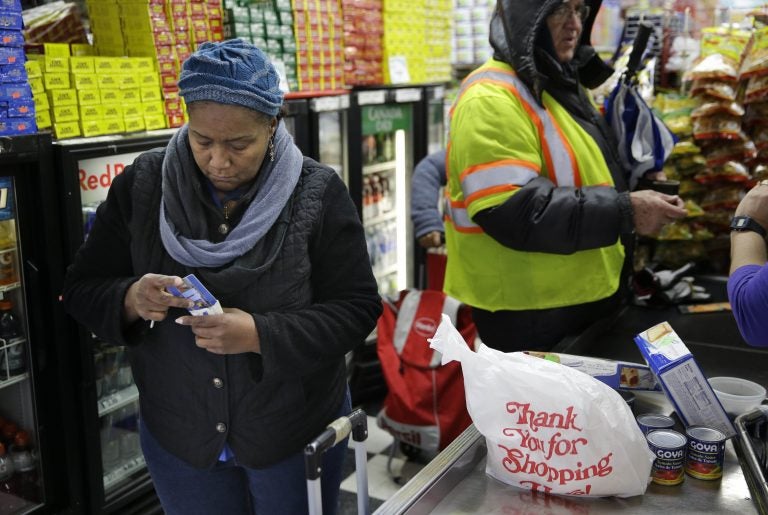Work requirement for SNAP food benefits divides GOP, unites Dems in Philly region
The proposed changes apply to a program intended to provide food to low-income families.
Listen 5:46
A woman organizes her pocketbook after paying for groceries with an EBT card (Seth Wenig/AP Photo)
As U.S. lawmakers returned to work this week after their Memorial Day recess, one priority on the congressional agenda is a farm bill that includes new work requirements.
The proposed changes apply to a program intended to provide food to low-income families.
A subcommittee chaired by Pennsylvania Republican U.S. Rep. Glenn Thompson took the lead in adding work requirements to this year’s farm bill. Thompson, whose district sprawls from Lake Erie almost to Harrisburg, said he’s proud of the changes made to what used to be food stamps, but is now called Supplemental Nutrition Assistance Program or SNAP.
Single parents with kids too young for school would be exempt from the new work requirements, he said.
“But for everyone else, we want them to have better access to skills-based education. And this doesn’t create new bureaucracy, this actually builds on what we already do under two existing laws,” Thompson said.
The GOP proposal is estimated to save some $20 billion for the SNAP program, in part by requiring able-bodied adults to participate in job-training programs for a minimum of 20 hours a week in order to keep getting SNAP benefits. Thompson calls it a no-brainer.
“Quite frankly — for those individuals who are work-capable adults, 18 to 59, who are not disabled and also don’t have children in the household that are not in school yet — we give them better access to more effective skills-based education,” he said. “And so what’s not to like? I don’t know why the other side is politicizing what we’re doing.”
But two Democrats from the Philadelphia region — also members of the House Agriculture Committee – are raising an alarm over the proposed change.
U.S. Rep. Lisa Blunt Rochester of Delaware estimates that 1 million people would be cut from the program over a decade if the work requirement is approved. That, she said, is unacceptable.
“There’s a missed opportunity because we all believe in work, and that work is important,” she said. “But what they want to do is create a massive new work program that is untested and underfunded.”
Ten pilot programs — including one in Delaware — are focused on job training for low-income families who use SNAP. Rochester is wondering why the GOP is barreling ahead with changes to the program without waiting for the results from the pilots.
“It is focused on really providing the supports and the training to help people on food stamps to go to work,” she said. “The pilots aren’t finished until 2019, so my question to the committee was, ‘Why are we putting the cart before the horse? Why don’t we find out what the research shows, what’s best practice?’ And then make those kind of changes.”
Another more pressing concern is that the GOP is proposing stiff penalties that could leave low-income families without food, Rochester said. Under the Republican plan, SNAP recipients who don’t meet certain requirements could lose the benefit for 12 months. A second infraction would render them ineligible for three years.
Rochester called that unfair.
“This is food on the table. These are children. The majority of people on SNAP are seniors, people with disabilities and children,” she said. “I think we need to go back to the drawing board and do something that really benefits all Americans.”
The sweeping legislation includes many subsidies and crop supports for the nation’s farmers. So the committee in charge of it has always been filled with agricultural state lawmakers. But the committee also includes many urban lawmakers who rely on the farm bill as the means of providing food to their low-income constituents.
That’s why U.S. Rep. Dwight Evans of Philadelphia said he’s so disappointed he and Democratic colleagues aren’t getting any input to this year’s bill.
“This is, my understanding, not what the farm bill was supposed to be about. Food is not Democrat or Republican, and is not poor or rich. I don’t know how they can think this is going to go anywhere. I don’t think this is good sound sense,” said Evans. “I always thought that the agriculture committee was about bringing people together, and they … are just going in the wrong direction.”
This year the farm bill is House Resolution 2. The massive tax overhaul bill was H.R. 1. Evans said that’s not an accident.
“This is really to pay for the tax package. You know, Social Security, Medicaid and with the SNAP program, all that pays for the taxes that they voted through House Resolution 1,” Evans said.
Other area GOP lawmakers members are split on the proposal. U.S. Rep Tom MacArthur of South Jersey said he supports it.
“I think that’s fair to the taxpayer to make sure that working-age, fully able people are either looking for work or are getting employed or are getting educated,” he said. “We want to help needy people. We don’t want to enable people that are in a different category.”
But U.S. Rep. Leonard Lance, a Republican whose district covers a swath of Central New Jersey, said GOP leaders are making a mistake because he doesn’t think voters put Republicans in charge of Washington to overhaul the nation’s safety-net programs.
“I think the election last time hinged on a variety of issues. I’m not sure if that was at the top of the list,” he said.
Far-right conservatives helped tank the farm bill a few weeks ago because they’re demanding a separate vote on immigration. Now GOP leaders have promised them that vote.
After that, the GOP is expected to take up the farm bill again with no concessions to win over Democrats. That means they’ll need to convince more moderate Republicans to support the legislation. Lawmakers in the Philadelphia region could be key to getting it over the finish line – or jettisoning it altogether.
WHYY is your source for fact-based, in-depth journalism and information. As a nonprofit organization, we rely on financial support from readers like you. Please give today.




